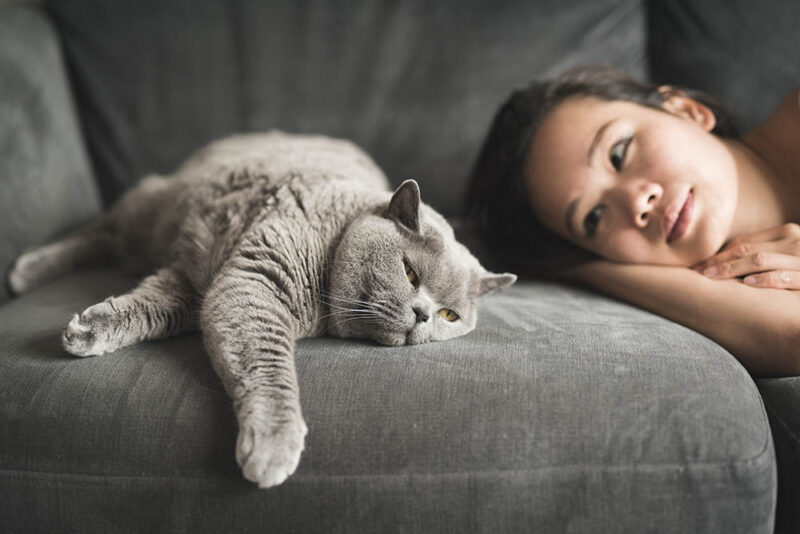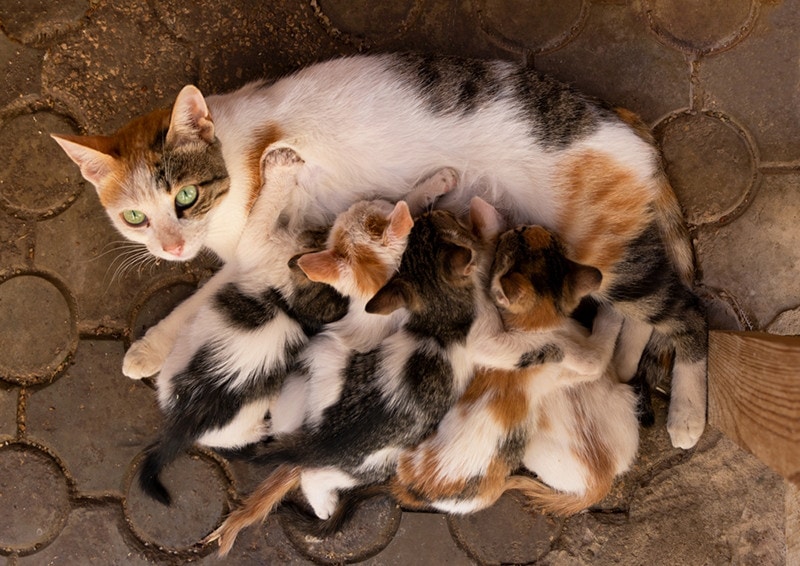Maine Coon vs Turkish Angora: Differences Explained (With Pictures)
Updated on
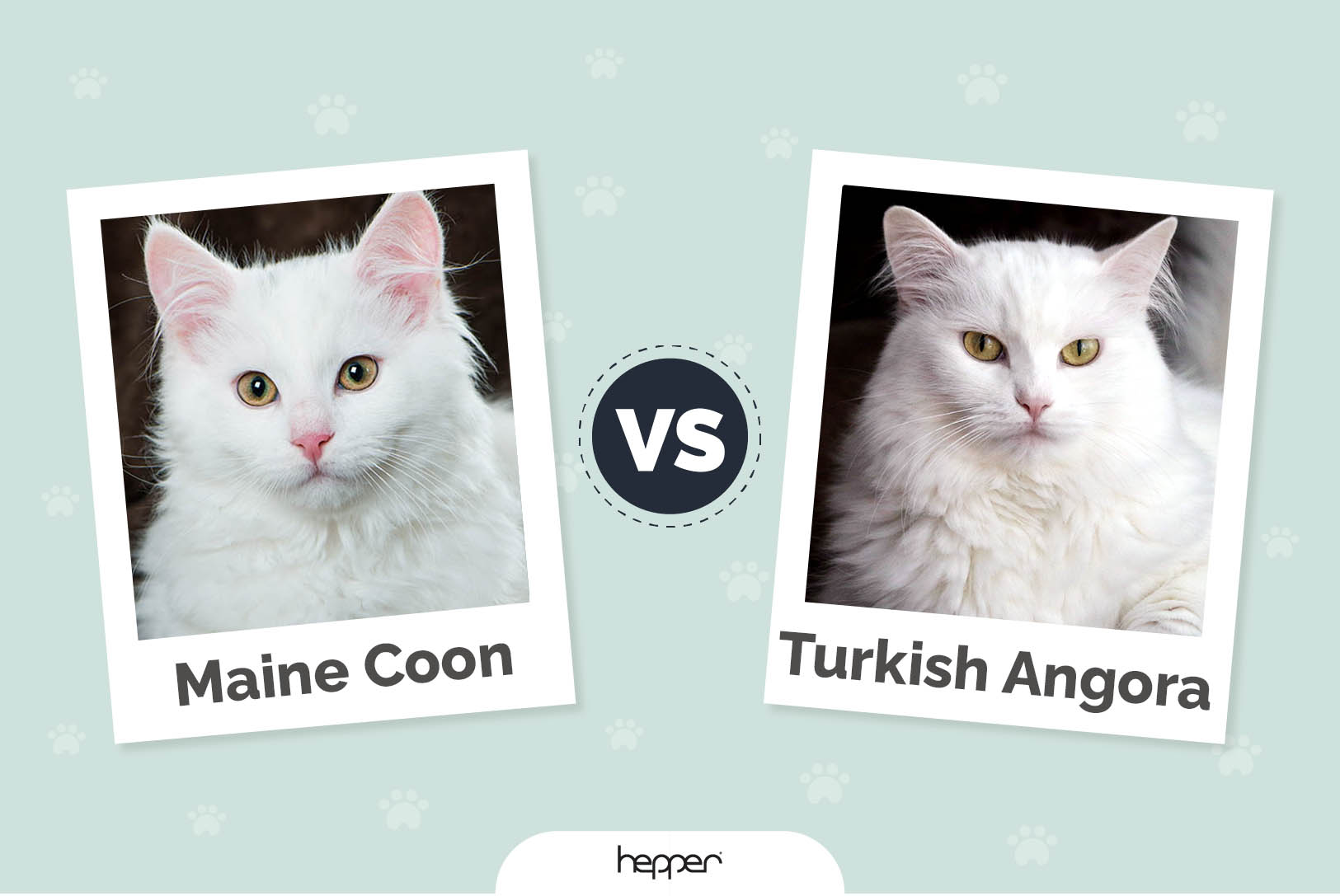
Click to Skip Ahead
The Maine Coon and Turkish Angora share a few physical characteristics, such as their long coat and bright, inquisitive eyes. They are also both very playful and intelligent. However, that’s where these similarities end. Where the Maine Coon is large, heavy-boned, and muscular, the Turkish Angora is medium-sized, fine-boned, and slight. While they are both very affectionate and friendly, Coons are just as likely to curl up next to you and are quite happy being an only pet whereas Angoras want to be as close to you as possible and seek constant companionship.
If you are considering either of these breeds because of their beautiful appearance, it’s important to choose the best one for your home based on their personality, health, and other factors as well. Below, we will cover these things and more so you can make the best decision for you and your new cat.
Visual Differences
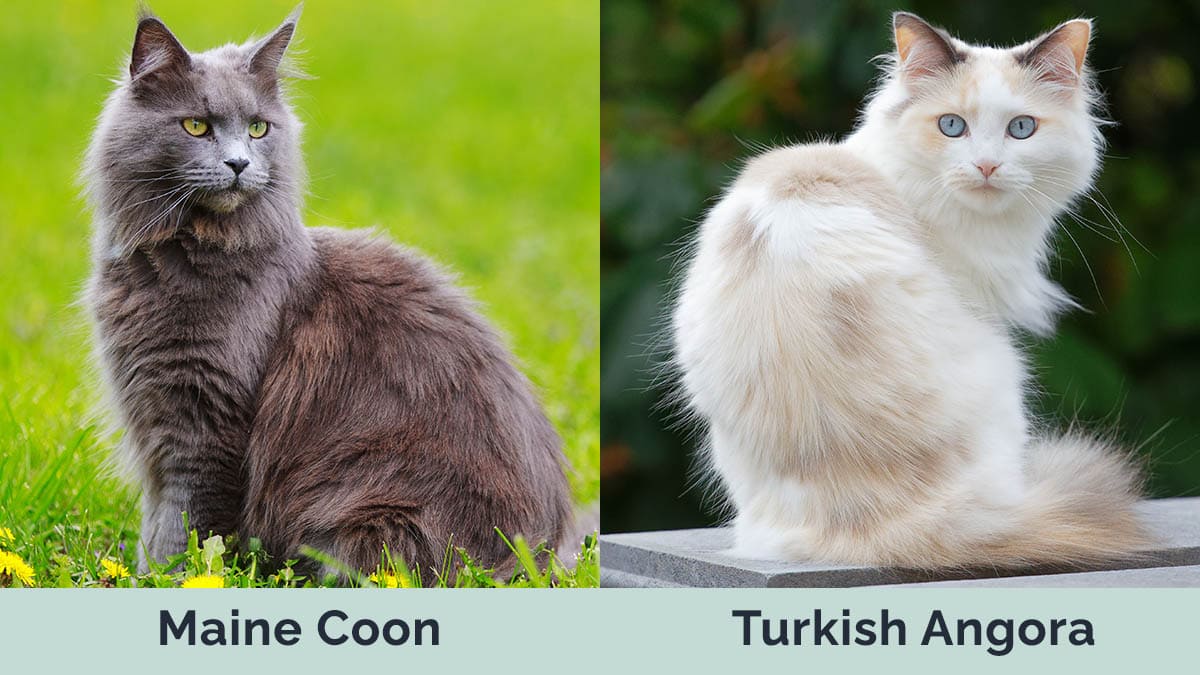
At a Glance
- Average weight (adult): 8–18 pounds (large)
- Lifespan: 9–13 years
- Exercise: 2+ hours a day
- Grooming needs: High
- Family-friendly: Yes
- Other pet-friendly: Often
- Trainability: Intelligent and motivated
- Average weight (adult): 5–10 pounds (medium)
- Lifespan: 9–14 years
- Exercise: 2+ hours a day
- Grooming needs: Moderate
- Family-friendly: Yes
- Other pet-friendly: Often
- Trainability: Intelligent but needs more attention
Maine Coon Overview
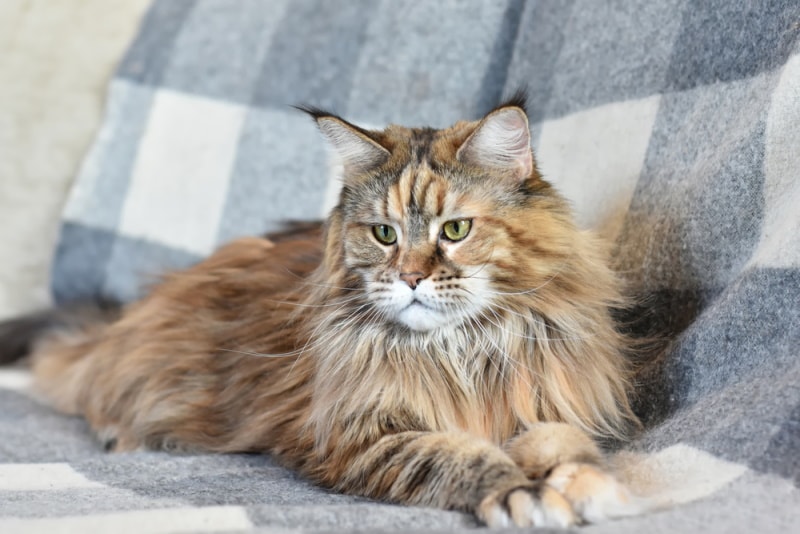
Personality/Character
You shouldn’t let their impressive size fool you. Maine Coons are known as “gentle giants” and are one of the most loving, affectionate cat breeds you’ll find. Thankfully, they prefer to choose a spot to curl up next to you instead of on your lap or shoulder, like the Turkish Angora. However, many Maine Coon cats will keep their kitten-ish playfulness long into their Golden Years. Being as large as they are, being playful can sometimes become comical as they accidentally knock things over, but they always seem to take it in stride, enjoying the spotlight when they make their owners laugh.
Training
Maine Coons are surprisingly trainable for a cat. This is because, in addition to being very intelligent, they are also highly motivated by treats. You would be too if you had to fuel all that extra muscle! Be sure to watch their weight and not overfeed treats, but work on trained behaviors over time and with a high quality, low calorie treat they enjoy. You should remember that Coons are very smart and may weasel their way into a few extra treats if you let them.
Health & Care
The most significant care investment for a Maine Coon cat is time. It will take a few minutes each day to brush their long coat to ensure it doesn’t get tangled or matted. This is because the fur on their belly and britches (hindquarters) is quite long and can drag the ground. Housecats can easily become lazier than outdoor cats, not grooming themselves enough to care for their coat adequately enough to prevent matting. Daily activity is also required, but with their comical antics, this shouldn’t be too hard.
Overall, the Maine Coon breed is a healthy one. However, like most breeds, they are susceptible to a few issues. Their large-boned stature makes them more prone to joint disease, especially later in life, which can be managed, especially if caught early. Dental disease and hypertrophic cardiomyopathy are also more common and are things to watch for.
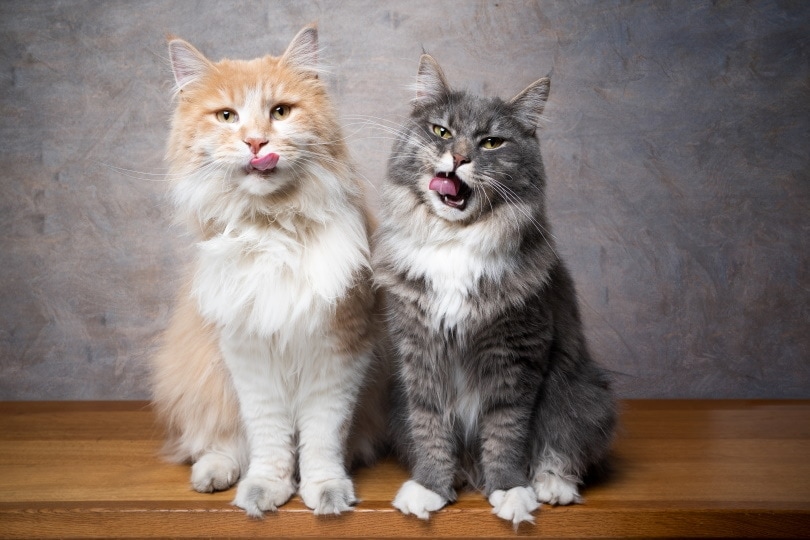
Suitable For:
Maine Coons are a great first pet for those who haven’t adopted a cat before. They are also surprisingly easy to care for and are perfect for those living alone or with a partner, for families, and even seniors. Coons get along with other pets, including dogs, as long as they are introduced properly, making them ideal family pets. They need a bit of room to run and stretch their long bodies, so small apartment living can be rough, but with some tall cat trees, it can be managed.
- Affectionate
- Sociable
- Long lifespan
- Not very vocal
- Extremely loyal
- Very playful
- Sheds a lot
- High grooming needs
- Quite large
- High prey drive
Turkish Angora Overview
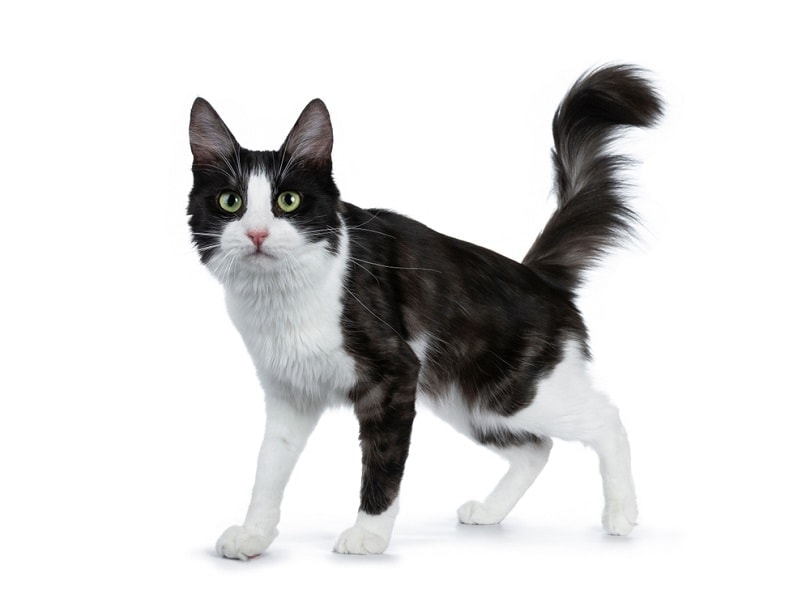
Personality/Character
No matter their age, the Turkish Angora will defy it with their playful and inquisitive nature. Their cleverness, however, will certainly get them into trouble when they decide to get into closed doors, boxes, and other places they shouldn’t be. They crave attention and will do almost anything to get it, including being silly or, in some cases, acting out negatively if they aren’t trained early out of bad behaviors. Turkish Angora cats typically don’t like to be alone, whether that’s keeping company with a human, another cat, or even a dog, they should always have someone around to spend time with. “Turkeys” are one of the most affectionate lap cats around.
Exercise
The Turkish Angora is about as active as they come, and agile too. They will need several hours of active play each day. Most cats will be happy to play on their own for a short time but will likely seek out a playmate for most of their fun, so be prepared to spend some time every day engaged with them. This is when having a playmate in the house helps, as they can romp around the house with another cat or even a pup just as easily as they can you. But, when they want your attention, nothing else will do and they will demand it.
Training
While not as easily trained as the Maine Coon, Turkish Angoras are still easier to train than many other cats. Be sure to work with them when they are receptive to it and for short periods of time until they’ve lost interest. Training when they are still very young is the best bet when trying to prevent unwanted behaviors. It is also the best time to introduce them to new family members and other pets, although this is still possible at any point in their life with patience and perseverance.
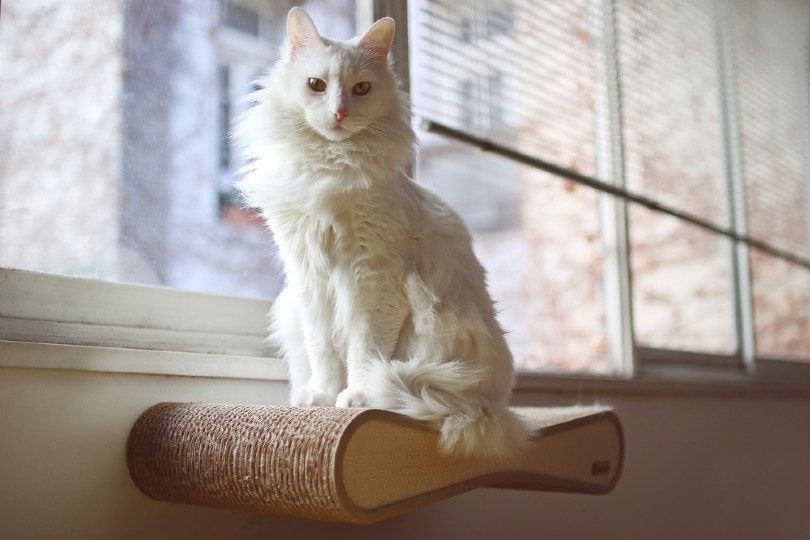
Health & Care
Turkeys need daily brushing, just like the Maine Coon. However, be sure to take extra care with their coat as it is very fine and easily pulled or their skin damaged. Because of their highly affectionate nature and their desire to be close to you, grooming time is likely to be a bonding experience. Angoras should also stay at a healthy weight. Unlike Coons who are very heavily boned, Angoras are fine-boned, and added weight puts a strain on their slighter frame.
As far as health conditions go, a good breeder should check for ataxia prior to adoption. It is a neuromuscular disorder that is fatal and affects very young kittens. Odd-eyed Turkish Angora cats, or those with two different colored eyes, are most likely to be deaf or suffer some type of hearing loss, although this rarely has any other health implications. Hypertrophic cardiomyopathy also affects Angoras.
Suitable For:
The Turkish Angora is a great choice for many households, so long as they can socialize with others often. A human or another pet should always be around to keep them company. For this reason, they are excellent companion animals for seniors, but they are great family pets as they get along well with children and other pets too. Because of their regular exercise needs, those in apartments should expect to spend extra time playing and invest in tall cat trees or other items.
- Affectionate
- Very playful
- Friendly toward strangers
- Gets along well with pets
- Typically very healthy
- Medium-sized
- Needs constant companionship
- Daily grooming required
- Can get themselves into trouble
- Very active, needs interaction
Which Breed Is Right for You?
Adding an energetic, playful, intelligent, and astonishingly beautiful cat to your home? Either the Maine Coon or Turkish Angora could be the right one. However, you should also consider their activity level as both of these cats need quite a bit of daily enrichment on top of extensive grooming. If you’re ready for that, then consider each breed’s personality.
Would the constant companionship of a Turkey fit your lifestyle better or perhaps the gentle affection of a Coon? We hope this guide has helped you make the best decision possible when adding a new kitty to your home!
Featured Image Credit: (L) Dora Zett, Shutterstock | (R) TheCats, Shutterstock



